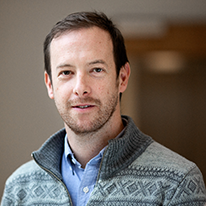
The Arctic is warming at twice the global average, a dynamic amplified by rapid declines in regional sea ice cover. Despite compelling signals of biome-scale terrestrial responses, fundamental knowledge gaps about the rate, magnitude, and drivers of these dynamics in the tundra remain widespread.
At AIAS, I will explore how scale, and its pervasive influence on pattern, influences regional and local measures of plant and animal response to climatic and/or biotic disturbances.
With emerging satellite datasets and AI approaches, one aspect of my project will examine weather-mediated and time-delayed linkages between marine cryosphere and terrestrial ecological dynamics across candidate regions of tundra.
At the landscape level, variability in the life history progression of individual plants ultimately drives broader-scale dynamics. I will investigate the structure of and landscape controls on this variability using collaborative datasets derived from drones and time-lapse cameras. Using computer vision approaches, these image sets will be mined for data comprising tens-of-thousands of individual-level plant life cycles. These in turn will allow for investigation into new, yet fundamental, questions about plant life-history variation through space.
Project title:
The many scales of Arctic ecological dynamics: confronting contradictions and gaps with new tech
Area of research:
Ecology & Geography
Fellowship period:
1 Feb 2020 - 31 Jan 2023
Fellowship type:
AIAS-COFUND II Marie Skłodowska-Curie fellow

This fellowship has received funding from the European Union’s Horizon 2020 research and innovation programme under the Marie Skłodowska-Curie grant agreement No 754513 and The Aarhus University Research Foundation.
